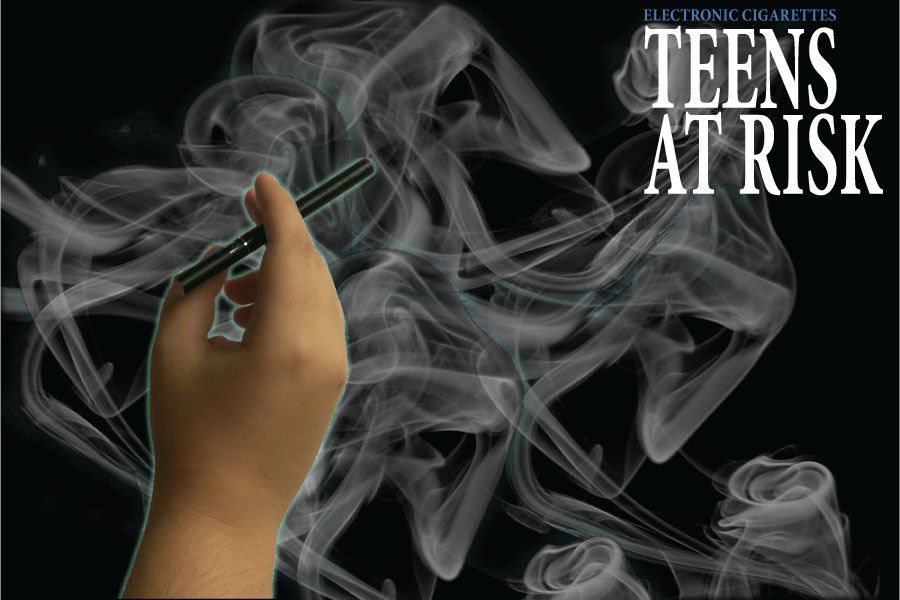E-cigs put teens at risk
While the use of conventional cigarette smoking is declining, an alarming number of teens are turning to electronic devices for a nicotine fix.
The epidemic sweeping the youth of the nation is the use of electronic cigarettes, more commonly referred to as “e-cigs.”
Not only does the overall look and feel of the e-cig attract younger people, but the variety of flavors available appeal to many young smokers. This is potentially dangerous because it makes teens more apt to try smoking e-cigs. Students are drawn in by the flavors that they know and love, such as cherry crush and piña colada, with over a hundred different flavors in all.
While many manufacturers of e-cigs claim that their products have many benefits, e-cigs deliver nicotine, an addictive substance that raises a user’s heart rate and blood pressure, according to the National Institutes of Health.
“Based on the studies that have been done, it’s not a safe alternative,” Angela Minicuci, a spokeswoman for the Michigan Department of Community Health, said in The Detroit News.
Advertisements claim e-cigs are a healthier alternative to conventional cigarettes, but recent studies have proven otherwise with the discovery of animal carcinogens and genotoxins in the tobacco alternative. These toxins are not only dangerous to immediate health, but can also permanently damage DNA.
Not only are the health concerns large, but the number of high school and middle school students who use e-cigs in the past year has doubled. While the number of users is still relatively low, the increase alone is troubling. According to the U.S. Centers for Disease Control & Prevention, about seven percent of students who have tried electronic cigarettes have never tried conventional cigarettes, which suggests that kids are starting to smoke because they view e-cigs as a healthier alternative to regular cigarettes. Furthermore, many are concerned that e-cigs could very easily be a gateway to regular, tobacco-burning cigarettes.
The increased usage of e-cigs amongst teens is troublesome because it makes smoking more accessible and acceptable. If this increase persists, the amount of teens smoking will be dangerously high.
In addition, smoking could become a thing that everyone does, like it was in the ‘50s. The amount of non-smoking teens who have tried e-cigs is about half of the amount of non-smoking adults who have tried them, which proves that children are not the only ones susceptible to new, dangerous products.
E-cigs are not taxed, so many law-makers oppose them just as much as non-smokers; however, since there is no actual tobacco contained in e-cigs, they can’t slap the high tax put on regular cigarettes. While this does help smokers’ wallets, it hurts the economy because cigarette tax generated $44.5 billion in 2011. The overall sales of electronic cigarettes have surpassed $1 billion.
Because e-cigs do not produce second-hand smoke, they can be used in establishments despite cigarette bans. This, however, may change as many businesses are self-imposing a ban.
While users continue to inhale a vaporized vial of chemicals to induce a “nicotine buzz,” long-term effects are unknown. Many counties and cities are beginning to put more regulations on e-cigs, including the U.S. Food and Drug Administration (FDA). The FDA has recently started doing more tests to validate whether or not e-cigs are as harmless as they claim to be.
No one asked for my I.D.
Electronic cigarettes can be legally sold to minors in Michigan because they are not classified as a tobacco product; therefore there is no age requirement to purchase them.
Not only are e-cigs easily available to kids, but their flavors, such as vanilla, chocolate, cherry, and grape, make them enticing to younger people, as well.
According to the U.S. Centers for Disease Control and Prevention, one in ten high schoolers have used an e-cigarette, making an age requirement a proiority for some lawmakers.
Attorney generals from forty states, including Michigan, sent the FDA a letter urging them to regulate e-cig sales and usage.
The letter urges the FDA to meet an Oct. 31 deadline to issue proposed regulations that will address the advertising, ingredients and sale to minors of e-cigarettes.
Michigan State Rep. Rick Outman introduced legislation last month prohibiting the sale to or use of electronic cigarettes by anyone under the age of 18.
“Anyone who uses these vapor cigarettes are still ingesting nicotine, which has been proven to be a serious health risk,” Outman said. “The use and sale of nicotine to minors in the form of tobacco products is already prohibited, and I believe the ban should extend to e-cigarettes as well.”
With the same regulations on e-cigs a traditional cigarettes, teen usage will decrease.









